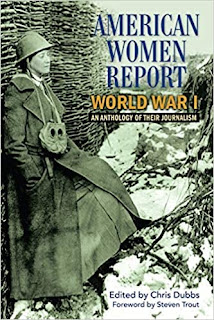With thanks to Chris Dubbs for his help in find out more about Richard, to AC Benus for his help in finding some of Richar’s poems and to Dr Connie Ruzich for the post on her weblog that led me to discover the Carnegie Tech poets and more.
Richard Gibbs Mansfield II was born in 1898. His father was Richard Mansfield (24 May 1857 – 30 August 1907) was a famous English actor-manager and his mother, an American actress, was Beatrice Mansfield, nee Cameron (1868 – 1940). They were married in 1892. Richard was their only child. Richard was also an actor and played the part of Prince Karl in his Father's play "Old Heidelberg". The picture of him left is from from “The Kansas City Times” 8 September 1916 - Newspapers.com - found by Chris Dubbs.
Richard Mansfield II attended Carnegie Institute of Technology – known as “Carnegie Tech”.
He volunteered as an ambulance driver in France early on in The First World War, though officially underage - albeit with his mother's permission. When America entered the war, he joined the U.S. Army and went to Texas to be part of an aviation unit. While there, he contracted meningitis and died in 1918.
While the list is known to be incomplete, approximately 900 Carnegie Tech students, alumni, and faculty served during The First World War. At least 44 students died in service. The first was Walter Crellin, a design student, who was on the Tuscania when it was torpedoed by a U-boat off the northern coast of Ireland on 5th February 1918. The last known death was Arthur H. McGill, a science student, who died of pneumonia in France on 2nd February 1919.
Here is one of Richard’s poems:
“For King and Country”
The king he sits in his chamber high^
With a hundred faithful courtiers by . . ,
What matter it if the soldiers die?
Tis all for King and Country!
Outside is heard the bugler's blare;
The band is playing a lively air.
See how the burghers stop to stare . . .
'Tis all for King and Country!
What matters it if far away,
In the trenches, they're dying every day?
While they're dying, hear them say:
'Tis all for King and Country!
Over the wires comes the news,
That this is a battle our enemies lose —
But our men they die in the bloody ooze,
'Tis all for King and Country!
The king, he smiles that the news is good;
His men are dying for the lack of food —
But it doesn't matter — ^when understood
Tis all for King and Country!
But for the mothers who weep, and for the babes who cry
And for the girls who wait, and for men who die,
Led to their death by a noble lie,
There'll be a reckoning by and by!
To be met by King and Country!
Richard Mansfield^ II
From “Carnegie Tech War Verse” (Carnegie Institute of Technology, Carnegie, Pittsburgh, PA, USA, 1918), p. 27
“Carnegie Tech War Verse” is a two-book set printed in 1918 entitled “The Soldier’s Progress and Carnegie Tech War Verse”. The books were edited by English professor Haniel Long of the Carnegie Institute of Technology (present-day Carnegie Mellon University)
Sources:
https://www.cmu.edu/news/stories/archives/2018/november/camp-carnegie.html
Press cutting from “The Kansas City Times” 8 September 1916 - Newspapers.com
https://behindtheirlines.blogspot.com/2018/10/the-little-folk
NOTES;
Author Chris Dubbs has written and edited books about WW1, such as
Historian, Writer, Translator and Poet AC Benus is the author of of a book about German WW1 poet Hans Ehrenbaum-Degele : “The Thousandth Regiment: A Translation of and Commentary on Hans Ehrenbaum-Degele’s War Poems” by AC Benus (AC Benus, San Francisco, 2020). Along with Hans's story, the book includes original poems as well as translations. ISBN: 978-1657220584
https://www.amazon.co.uk/dp/1657220583
Dr. Connie Ruzich, a former Fulbright Scholar in the UK, is now a University Professor at Robert Morris University Sewickley, Pennsylvania, USA. She has edited a WW1 Anthology entitled “International Poetry of the First World War: An Anthology of Lost Voices” Editor Constance M. Ruzich (Bloomsbury Academic, 2020) and also has the WW1 poetry website Behind their Lines
https://behindtheirlines.blogspot.com/



